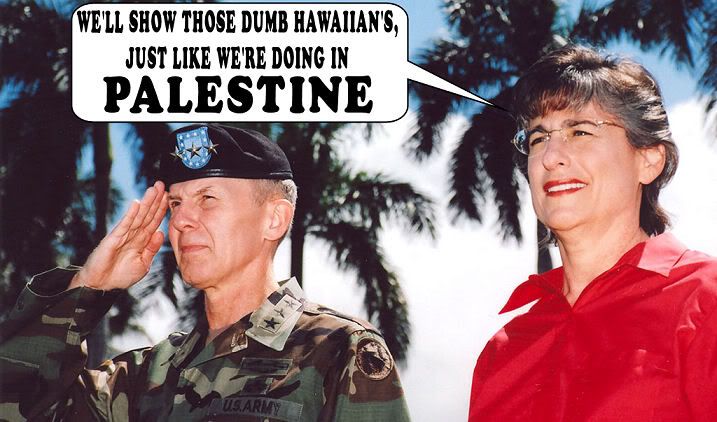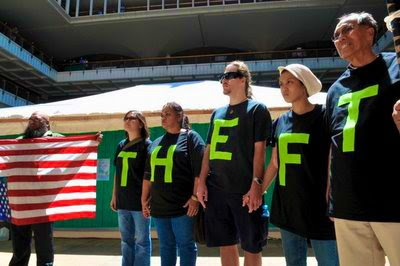All Posts (6434)

May 8, 2009
US denies 147 civilians killed in Afghan violence
By FISNIK ABRASHI
Associated Press Writer
KABUL (AP) — The U.S. military said Friday reports that as many as 147 civilians died in fighting involving American forces and the Taliban were “extremely over-exaggerated” and investigators were still analyzing the data collected at the site.
In the south, meanwhile, four NATO soldiers and 21 civilians died in a string of insurgent attacks, and an unmanned U.S. drone crashed in central Ghazni province.
Officials said preliminary findings of the joint U.S.-Afghan investigation into the deaths in the villages of Ganjabad and Gerani in the western Farah province could be released as early as Friday, but they have yet to schedule an announcement.
Reports of the large number of civilian deaths come at an awkward time for the Obama administration, as the U.S. steps up its military campaign here while emphasizing the importance of nonmilitary efforts to stabilize the country.
While past reports of civilian deaths at the hands of international forces drew an immediate outcry from President Hamid Karzai’s administration, this time the response was muted. The most vehement reaction came from lawmakers, who demanded an agreement regulating the operations of foreign troops.
A local official said that he collected from residents the names of 147 people killed during fighting on Monday night and Tuesday. If true, it would be the deadliest case of civilian casualties in Afghanistan since the 2001 U.S.-led invasion that ousted the Taliban regime.
But the U.S. military described that toll from the fighting as over the top.
“The investigators and the folks on the ground think that those numbers are extremely over-exaggerated,” U.S. military spokeswoman Capt. Elizabeth Mathias said. “We are definitely nowhere near those estimates.”
Mathias said she could not yet provide estimates of how many people were killed because the team has yet to produce its findings.
Afghan residents say the destruction was from aerial bombing. U.S. officials have suggested that at least some of the deaths were caused by insurgents, whom the military accuses of using civilians as human shields when fighting with its forces.
In a video obtained Friday by Associated Press Television News, villagers are seen wrapping the mangled bodies of some of the victims in blankets and cloths and lining them up on the dusty ground.
In one shot, two children are lifted from a blanket with another adult already in it. The children’s faces are blackened, and parts of their tunics are soaked in what appears to be coagulated blood.
Their limp bodies are then put on the ground, wrapped in another cloth and put next to the other bodies. It was not clear how many bodies were in the room where the video was shot.
The man who shot the video said many of the bodies he filmed in the village of Gerani on Tuesday were in pieces. He spoke on condition of anonymity out of fear of retribution from security agencies.
It was not possible to independently verify the authenticity of the video.
Investigators on Thursday visited the scene of the violence, where sobbing relatives showed them graves and the demolished buildings where they said the victims had sheltered.
“The joint investigators are back and they are all discussing what they found,” Mathias said. “We are still corroborating.”
President Barack Obama expressed sympathy over the loss of life in a White House meeting Wednesday with Afghan President Hamid Karzai, who contends that such killings undermine support for the fight against resurgent Taliban militants.
U.S. Defense Secretary Robert Gates, whose two-day visit in Afghanistan was overshadowed by the case, offered a new expression of U.S. regret for the deaths but stopped short of taking blame.
“We regret any, even one, innocent civilian casualty and will make whatever amends are necessary,” Gates said Thursday during a visit to the war zone. “We have expressed regret regardless of how this occurred.”
Abdul Basir Khan, a member of Farah’s provincial council who said he helped the joint delegation from Kabul with their examination Thursday, said he collected names of 147 dead — 55 at one site and 92 at another. Khan said he gave his tally to the Kabul team.
He said villagers told investigators that many of the dead were buried in mass graves of 20 or so people. Investigators did not exhume the bodies, according to Khan.
“They were pointing to graves and saying, ’This is my son, this is my daughter,”’ Khan said.
Villagers said they gathered children, women and elderly men in several compounds near the village of Gerani to keep them away from the fighting, but that the compounds were hit by airstrikes. The International Committee of the Red Cross has also said that women and children were among dozens of dead people its teams saw in two villages.
But what happened remained a matter of dispute.
Three U.S. defense officials, speaking anonymously, said Thursday that it is possible the investigators would find a mix of causes for the deaths — that some were caused by the firefight between the Americans and the Taliban, some by the U.S. airstrike and some deliberately killed by Taliban fighters hoping U.S. bombings would be blamed.
In southern Afghanistan, meanwhile, NATO said four of its soldiers died in a series of clashes and bombings.
Two of the alliance’s soldiers died in a suicide attack in the southern Helmand province Thursday, NATO said in a statement. The blast also killed 21 civilians and wounded 23 others, said Daud Ahmadi, a spokesman for Helmand’s governor.
Initially, only 12 people were reported killed in the attack.
Separately, a NATO soldier was killed in a roadside bomb, also in southern Afghanistan, where another British soldier died from a gunshot wound Thursday.
Southern Afghanistan is the center of the Taliban-led insurgency. Obama has ordered thousands of new troops to join the fight there and reverse the Taliban gains.
On Friday, a U.S. Air Force Predator drone went down in central Ghazni province’s Qarabagh district, Mathias said. She ruled out insurgent activity in the area of the crash.
However, Zabiullah Mujaheed, a Taliban spokesman, said they had shot the drone down. It was impossible to verify the claim.



May 7, 2009
One mile, two beach parks and 48 cabins
By Lee Cataluna
There's the beach park at Waimanalo and, just down the road, Bellows Beach. They are separated by a mile, but they are worlds apart.
Bellows is under the control of the military, with limited public access on weekends. Waimanalo is public and open, a free-for-all with minimal control and upkeep by the city.
The big difference between the two is that Bellows is clean and, for the most part, orderly. It's not pristine, but it's pretty good even after a weekend of hundreds of sunbathers, bodysurfers, shore fishers, hibachi-cookers, pickup truck picnic parties and dog walkers.
Waimanalo is home to an ever-changing but always present blue-tarp commune. There's trash spilling out of Dumpsters, dirty bathrooms and, to be honest, not always the family-friendly vibe that Sherwood Forest suggests.
And some in Waimanalo are actually arguing for the military to give back the land at Bellows? Yikes. Two words: Barbers Point. Been out there lately to experience the excellent stewardship of the state after the Navy gave it up? This is where plastic bags, old tires and discarded appliances go on vacation.
The plan to build 48 more cabins for recreational use by military families set off the reaction. There are already cabins there, but the very idea of building dozens of ANYTHING on nice beachfront land gets keiki o ka 'aina worried (and not without good reason). It's a prudent thing to ask questions and demand answers.
But it's a big jump from asking questions about 48 cabins to "Give us the land back," especially when there is no money to take care of that land as well as the military has. It's odd that the argument is the opposite of the fight to return Kaho'olawe to the state. That was: "You guys have no business bombing that island. Give it back." This is: "You guys aren't even using the land for training. Give it back."
The military would be wise to recognize the sensitivity in the community to any project of this type. A statement from the Air Force categorized the proposed cabins as "... an obligation to provide recreational opportunities for our war fighters when they return from defending the nation." This isn't about a nation's obligation to its soldiers. It's about development, and specifically, shoreline development for an exclusive group, the most sensitive of all in these islands. Maybe they don't need to build 48 more cabins right now. There are plenty of empty rooms in Waikiki and hotels dying to give deals to servicemembers.
Lee Cataluna's column runs Tuesdays, Thursdays, Fridays and Sundays. Reach her at 535-8172.

 Replying to Madmax808:Being a coward is never flattering or honorable. It is one of the most disguisting and replusivechoices in life. He will never sleep well in his lifetime. He will never make it up to his fellow Americans.Ponosize Wrote:Being a Brainwashed sheeple, torturing and genociding other nations , countries for resources and GREED is much better ?Hawaii is a good example , Illegal Occupied & ruled for over 116 years.In 30 more Years There will be no more Pure Hawaiians , in 50 no more 50%ers or above..Hawaii , is Still a Sovereign "Neutral" nation & kingdom but ILLEGALLY OCCUPIED AND MADE A # 1 TARGET WITH WEAPONS OF MASS DESTRUCTION BY USA!http://hawaiiankingdom.orghttp://hawaiifakestate.com
Replying to Madmax808:Being a coward is never flattering or honorable. It is one of the most disguisting and replusivechoices in life. He will never sleep well in his lifetime. He will never make it up to his fellow Americans.Ponosize Wrote:Being a Brainwashed sheeple, torturing and genociding other nations , countries for resources and GREED is much better ?Hawaii is a good example , Illegal Occupied & ruled for over 116 years.In 30 more Years There will be no more Pure Hawaiians , in 50 no more 50%ers or above..Hawaii , is Still a Sovereign "Neutral" nation & kingdom but ILLEGALLY OCCUPIED AND MADE A # 1 TARGET WITH WEAPONS OF MASS DESTRUCTION BY USA!http://hawaiiankingdom.orghttp://hawaiifakestate.com
May 7, 2009
Army drops 3 charges against Iraq war objector Watada
By William Cole
Advertiser Military Writer
The Army yesterday said it has given up efforts to retry 1st Lt. Ehren Watada on three charges for refusing to deploy to Iraq in 2006, but has not made up its mind about two other court-martial charges or the possibility of administrative punishment.
More than a year and a half after he would have left the Army — had he deployed as ordered — the 1996 Kalani High School graduate still reports to a desk job at Fort Lewis in Washington state.
Watada is likely to continue to have to do so as the Army weighs its next move.
The Honolulu man, the first commissioned officer to publicly refuse deployment to Iraq, said the war was illegal and unjust, and that participating in it would make him a party to war crimes.
Watada, who said he would have deployed to Afghanistan, also accused the Bush administration of deception in starting the Iraq war.
Fort Lewis spokesman Joe Piek yesterday said the Army was informed late last week that the U.S. Justice Department — which represents the Army in the case — had decided against continuing with an appeal of an October 2008 federal court ruling.
U.S. District Judge Benjamin H. Settle of Tacoma ruled at that time that the Army could not retry Watada on a charge of missing his Stryker brigade unit's movement to Iraq, and two specifications of conduct unbecoming an officer for taking part in a press conference and participating in a Veterans for Peace convention.
Watada raised double jeopardy, the constitutional protection against being tried twice for the same crime, after a military judge declared a mistrial at Watada's first court-martial in February 2007.
Two other charges of conduct unbecoming an officer were withdrawn, but not dismissed, as a result of Watada's court-martial, officials said.
The Army appealed Settle's October ruling, but the Justice Department under the Obama administration has now dropped that appeal.
Asked why the appeal was dropped, Piek said, "That would be a question you would have to ask (the Justice Department). I don't know.
"Right now, the other two specifications of conduct unbecoming an officer are still relevant in the case."
He said the leadership at Fort Lewis "is considering a full range of judicial and administrative options that are available, and those range from court-martial on those two remaining specifications, to nonjudicial punishment, to administrative separation from the Army."
'Significant victory'
At one time, Watada faced up to six years in prison for refusing to board a plane for Mosul, Iraq. Jim Lobsenz, an attorney for Watada, in October said his client at most faced one to two years on the remaining two charges. But the attorney said he was confident the remaining two charges, if pursued, would be thrown out as well.
Ken Kagan, another attorney representing Watada, yesterday said the Army conceivably could have drawn out its appeal on the three charges against Watada into late 2010 or early 2011.
"So having this one cleared away and no longer an issue is a significant victory in the sense that now we can focus on really getting this thing resolved," Kagan said.
Kagan said the Justice Department's solicitor general "sought to take that leadership position" in dropping the Army appeal.
"It's obviously a bold decision to depart from past policies, so we're very pleased they saw fit to do that," he said.
Kagan said discussions continue with the Army "to see if we can find some common ground" on the remaining issues.
global spotlight
Watada gained international attention as an Iraq war objector, and he served as a rallying point for the antiwar effort.
But he also was reviled by many in the military who said he violated his oath as an officer, and that he had no right to decide whether the Iraq war was just or unjust.
Piek, the Fort Lewis spokesman, said Watada's service in the Army was scheduled to end in December 2006, but the soldier was subject to "stop loss" — the ability to keep troops in for deployment — and was subject to his unit's deployment to Iraq.
His brigade returned from Iraq in September 2007 after 15 months, and Watada would have been eligible then to leave the Army.
Piek said Watada now is part of the rear detachment headquarters for I Corps.
"He's still coming in doing PT (physical therapy) and then works from 9 to 5 and occasionally I see him here at the gym," Piek said.
Piek added that "what is most disturbing for us, is that this case really needed to be heard by a jury and to be decided by a jury, and it's very unfortunate that more than two years ago the first court-martial ended in a mistrial on a technicality."
Lt. Col. John Head, the military judge, made the decision to call off the court-martial in its third day as Watada was ready to take the stand in his own defense
 FIND THE FACTS HEREHawaiiFakeState.com
FIND THE FACTS HEREHawaiiFakeState.com
P.S. Happy birthday to my identical twin sister, Lisa Noelani! Get it? Lana ULUlani and Lisa NOElani LOL One of our cousins from Keaukaha is smart. He calls both of us "LisaLana." That way he is never wrong LOL
 WANT THE FACTS?GO HEREwww.HawaiiFake State.com
WANT THE FACTS?GO HEREwww.HawaiiFake State.com
